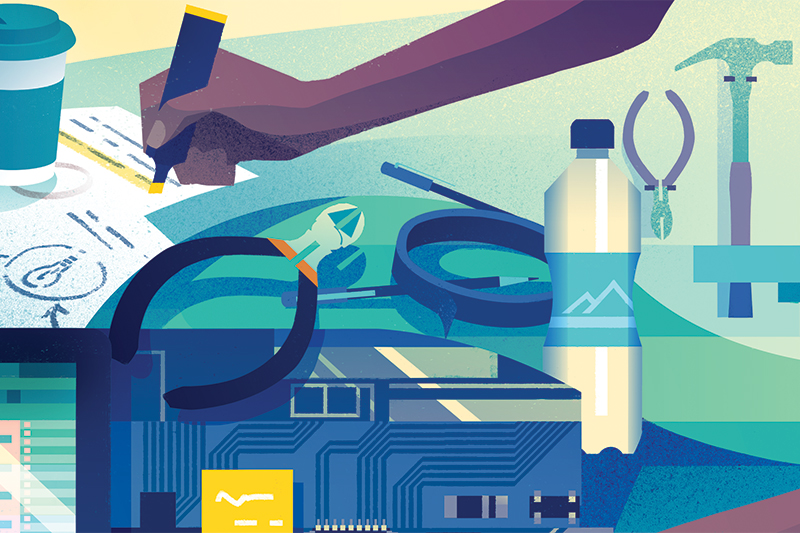
Innovation
Agents of Change
Jonathan Spiegel ’17, Daniel Delgado ’17, Jillian Jacques ’19, and Amanda Arango ’19, define a new generation of innovators and prove that nothing has to be the way it is now.
ALUMNI MAGAZINE
Jonathan Spiegel ’17, Daniel Delgado ’17, Jillian Jacques ’19, and Amanda Arango ’19, define a new generation of innovators and prove that nothing has to be the way it is now.
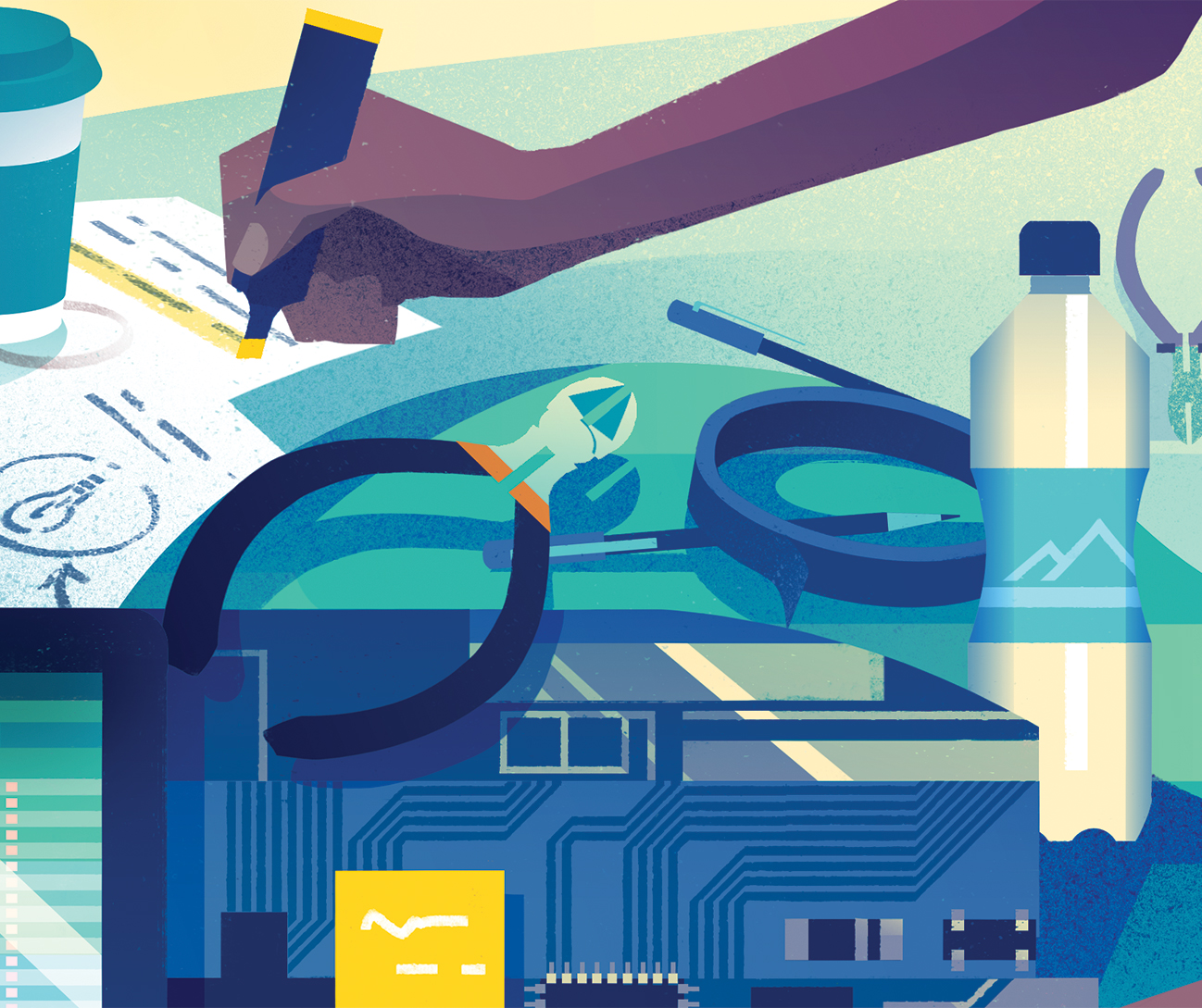
If you’re not a fan of the status quo, then you’ve come to the right place. Our rules are simple: if someone tells you something is inconceivable, test the boundaries; if you are frustrated, push forward — you are on to something big; and, if at the end of the day, the space around you is a complete mess, great job! A true tinkerer needs room to strew parts.
Jonathan Spiegel ’17, Daniel Delgado ’17, Jillian Jacques ’19, and Amanda Arango ’19 exemplify these tenants and share a different take on what it means to create something new. It isn’t enough to be a "maker" — you need to have the breadth of expertise to inform your approach, the humility to ask questions and lean on others, and a thoughtful consideration for the resources necessary for tackling whatever problem it is you’re trying to solve; this is exactly why these four change agents were a perfect fit for a relatively new and extremely unique role at the University of New Haven — Innovation Fellow.
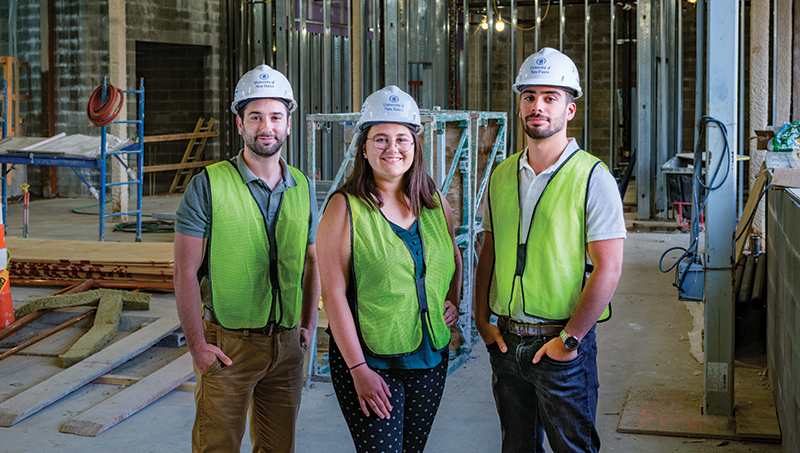
The parent program — aptly named the University Innovation Fellows (UIF) Program — is borne out of the Hasso Plattner Institute of Design at Stanford University and was created as part of the National Center for Engineering Pathways to Innovation, a five-year National Science Foundation grant, to provide students with the tools and strategies to make change on their campuses. The UIF motto? "We believe students can change the world."
Each year, those University of New Haven students accepted into the UIF Program embark on a wild ride. Mentored by Maria-Isabel Carnasciali, Ph.D., associate professor of mechanical engineering and chair of the Department of Engineering and Applied Science Education, fellows travel to the global UIF Silicon Valley Meet up in Palo Alto, collaborate in labs on the Google campus, and receive year-round mentorship from Stanford professors and industry leaders. When they return to the University, they put what they learned into action. In essence, they serve as advocates for lasting institutional change.
Our rules are simple: if someone tells you something is inconceivable, test the boundaries; if you are frustrated, push forward — you are on to something big; and, if at the end of the day, the space around you is a complete mess, great job!
The University’s participation has been funded in part by the Kern Entrepreneurial Engineering Network (KEEN). Despite the specificity of its name, KEEN encourages an entrepreneurial mindset in students across all disciplines — one which requires maintaining a curiosity about our changing world, gaining new insights and making connections, and identifying unexpected opportunities to create value. The cover of this issue of the University of New Haven Alumni Magazine pictures the construction site of what will one day be the fully envisioned Bergami Center for Science, Technology, and Innovation — a building that will serve as a vibrant hub for all University students to come together and do just that: test ideas, create new products, pursue new interests, and deepen their emerging passions.
Spiegel, Delgado, Jacques, and Arango are just four of twelve — and counting — "agents of change" to have served as University of New Haven Innovation Fellows, representing four different cohorts, respectively. We hope that you enjoy tagging along on their incredible journeys and look forward to sharing still more innovative tales in the issues to come.
Jonathan Spiegel ’17 is a self-identified troublemaker. What he means by this, he explains, is that he challenges things if he doesn’t understand why they are the way they are.

At the University of New Haven, Spiegel was able to embrace this disruptor mentality and dive deeper into his passion for innovation and entrepreneurship. As a sophomore, he had an unprecedented opportunity. At the encouragement of his professors, he applied to and was accepted to participate in Stanford University’s Hasso Plattner Institute of Design’s global initiative — the University Innovation Fellow (UIF) Program — and serve as the University of New Haven’s first Fellow.
At the time, there were only 300 Fellows in the program (there are now just under 2,000 Fellows from 258 global institutions in this prestigious community). Spiegel credits his time at the University and the encouragement and resources afforded by his faculty mentors with his ability to take full advantage of this opportunity.
As a University Innovation Fellow, Spiegel spearheaded the first-ever 3 Day Startup, a statewide program which allowed students from local colleges and universities to come together to develop ideas and turn them into real startup companies. "In order to make that event a reality," Spiegel says, "I had to pitch it to countless deans and members of the administration in order to show the value that it would bring to the University."
Getting the event off the ground took almost a year. "There were several weeks that I would work on it during the day, and I wouldn’t be done with my homework until 3 a.m.," Spiegel says. He raised upwards of $12,000 in donations from alumni; arranged for buses, t-shirts, and food; recruited angel investors to judge innovation competitions; and organized a trip to the Grove, a collaboration space in New Haven. They had a great turnout, with passionate students who created professional- level presentations to promote their ideas. "It wasn’t high stress, but it was high energy — and exciting," he says. "Everyone was blown away."
"Getting a taste of what it’s like to start up your own company — the hours you put in, the energy — inspired me."Jonathan Spiegel '17
The event was so successful that it has since evolved into what is now considered to be one of the University’s signature entrepreneurial events, Charger Startup Weekend. Spiegel helped with the transition. "I couldn’t do it forever, and I always wanted it to be sustainable," he says. In addition, Spiegel also helped promote the University at the first-ever White House Demo Day in Washington, D.C.; pitched the merits of innovation and entrepreneurship to the Board of Governors and to local and state legislators; and, most recently, took part in helping to plan the University’s cornerstone campaign building project, the Bergami Center for Science, Technology, and Innovation.
Since graduation, Spiegel has worked as an applications engineer at RBC Heim Bearings, which develops highly engineered bearings and other kinds of joint solutions for the rapidly growing aerospace, defense, and mining industries. He got a chance to meet the CEO, Dr. Michael Harnett, while he was still a student, after receiving a scholarship in his name, and made sure to introduce himself and share his resume.
Spiegel’s role as an Innovation Fellow and his time at the University were, although later in his life, formative years. "I learned you should not be afraid to stand up and give your input," Spiegel says. "You can make a difference." And though he’s now interested in learning how things operate within a corporate setting, he hopes to own his own business one day, stating: "Getting a taste of what it’s like to start up your own company — the hours you put in, the energy — inspired me."
Daniel Delgado ’17 is working at his dream job. As an associate engineer at Metro-North Railroad, Delgado manages multiple projects in an extraordinarily complex transportation system that includes the busiest commuter rail line in the United States: the New Haven Line.
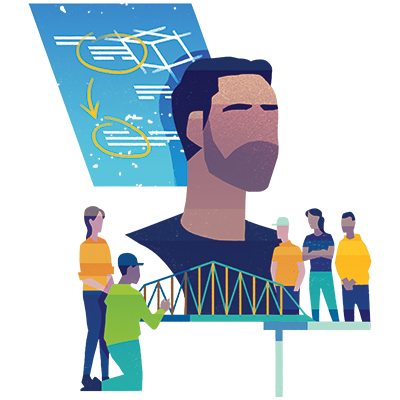
The New Haven Line runs from New Haven, Connecticut, southwest to Grand Central Terminal, and transports 125,000 people a day. It’s the kind of job he dreamed about when he was growing up in New Rochelle, New York, when he first became fascinated by, as he puts it, "all things that move and things that don’t move" — in other words, machines and structures.
It was the Kern Entrepreneurial Engineering Network (KEEN) program, Delgado says, that gave him the skills he needed to get that job. During his sophomore year, Delgado was selected to be the University’s first peer mentor and student coordinator, a KEEN-funded position.
Over the next two years, he worked with University engineering faculty and developed a strategic plan to ensure that the department began to approach curriculum and program development with an innovative mindset setting priorities, focusing energy and resources, strengthening processes, and making certain that faculty and administration alike were working toward this common goal. One important piece of this was his work to create a small, entrepreneurial community within the University’s larger Engineering Learning Living Community (LLC). The LLC allows first- year engineering and applied science students to live together in a residence hall, take similar courses, meet with faculty mentors throughout the year, and participate in special group activities both in the residence hall and off campus. Delgado’s initiative, E2LLC, offers a variety of enriching activities, including monthly discussion dinners, industry competitions, engineering challenges, 24-hour "Imagination Quests," and tours of companies that one day may very well be potential employers for the LLC members. Delgado also mentored and tutored first-year engineering students.
"Working on the strategic plan and E2LLC really changed my perspective. It created this bridge between engineering and business that I feel is lacking in technical education."Daniel Delgado '17
Before working with KEEN, Delgado planned to focus his career pursuits on his industry major, civil engineering. "Working on the strategic plan and E2LLC really changed my perspective," he says. "It created this bridge between engineering and business that I feel is lacking in technical education." In engineering school, you’re primarily focused on numbers, he says, but not on financial numbers. Civil engineers work with numbers related to structures and foundations, and mechanical engineers with numbers related to designing machines. "In the real world, you also have to consider resources and feasibility and build a sustainable business model." In addition to his role as a KEEN mentor and coordinator, Delgado succeeded Spiegel and became the University’s second Innovation Fellow, continuing to build on these initiatives and to inspire new ones — activities which only further strengthened his desire to pursue a career that necessitated an integration of entrepreneurship and business.
This speaks to yet another reason why his current job is so perfect for him. "In my role at Metro-North, you have to have the engineering background to understand the problems of the project and the nature of the construction, but you’re responsible for maintaining both the budget and the schedule," he says. "I’ve learned it never hurts to suggest a new way to conduct business. That, to me, is the essence of innovation: trying to do something that hasn’t been done before."
This summer, Jillian Jacques ’19 will be leading a team of software developers at recruiterboom, a startup recruitment agency in Londonderry, New Hampshire, that focuses on "we culture": empowering all of its employees to explore how their interests and talents can be applied to the business.
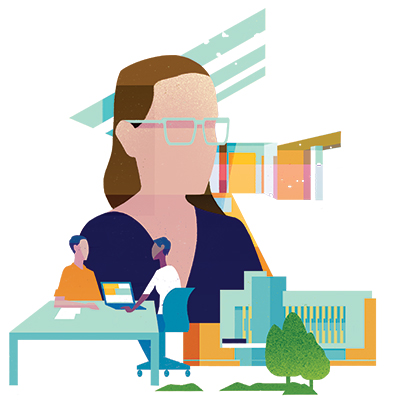
The agency describes itself as an "innovation incubation center," and Jacques doubts she would have pursued a position there if she hadn’t been a 2017 University Innovation Fellow. Just a few years ago, as a computer science major, she found the word innovation somewhat intimidating — she’d always thought it meant creating something entirely new: a product, method, or idea. But going through the UIF Program taught her that innovation is also about collaboration: sharing ideas and working with others to see how their experiences and yours can solve a problem or clarify next steps.
Like Delgado, Jacques found great value in working with KEEN. She credits the program, which showed her how to combine her engineering background with business strategies and tools, with helping her learn a critical career skill: how to pitch herself. "All of the innovation programs — KEEN, UIF, and everything else I’ve experienced on campus — really pushed me to grow as a person," she says. "I don’t think I’d be as confident as I am now if it hadn’t been for those opportunities and for the professors who pushed me to step outside the proverbial — yet ever-present — comfort zone and into a place where it was safe to experience failure."
Experiencing failure is "absolutely necessary," she says. "I hate the idea of it, but I’ve come to understand and appreciate why it’s important. Failure can teach you what direction to go in and what parts of your idea did and didn’t work. It teaches you how to take criticism. If you can fail gracefully, you’ll have a huge leg up in every aspect of life."
"Failure can teach you what direction to go in and what parts of your idea did and didn’t work. It teaches you how to take criticism. If you can fail gracefully, you’ll have a huge leg up in every aspect of life."Jillian Jacques '19
It’s also an almost inevitable part of taking risks, which Jacques has been willing to do since the start of her undergraduate education. She grew up in the town of York, in south central Pennsylvania, yet chose to spend her first semester at the University taking courses in Prato, Italy, on the University’s Tuscany Campus. Jacques started looking at colleges in her early teens, and one of the many reasons she was drawn to the University of New Haven was its willingness to incorporate study abroad in an engineering program. That first semester opened her eyes to a wider world and taught her that, with a little luck, "you’ll always run into people who can help you." Perhaps most important, it set the tone for the rest of her college experience: always expanding her horizons and setting her sights further than what is expected.
Jacques is graduating in December and hopes to go into software development project management. Rather than "always say yes" — the advice often given to striving innovators, entrepreneurs, and creators of every type — she’d advise future students to "take advantage of opportunities, but say yes only as often as you feel comfortable. Set boundaries, but not to hold yourself back. Set boundaries to keep yourself healthy."
Like many little kids, Amanda Arango ’19 had a lemonade stand, although in her case it was more like a pop-up store, one that she strategically relocated around her neighborhood to maximize the benefits of rush-hour foot traffic.
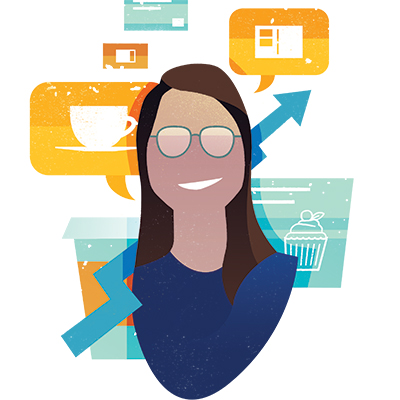
And unlike most kids, she took this entrepreneurial impulse to the next level, launching her first business — a cake-decorating venture called Scrumptious Treats — while she was still in elementary school. Although most of her marketing took place at her nieces’ and nephews’ birthday parties, she created a business card and printed flyers, and by sixth grade was earning upwards of $25 a cake. By high school, she was dreaming of owning a coffee shop, despite the challenges of selling hot beverages in her hometown of Miami.
When Arango started at the University of New Haven as a marketing major, she was firmly attached to the idea of one day starting her own business. Walking around campus her first semester, she saw posters for Startup Weekend, which had taken on even greater momentum since Spiegel helped launch the initiative several years prior. "In just three days, I got to see what my life could be like as an entrepreneur," she says. "I loved every bit of it." Her team won that year’s competition — they built a platform, Interview4U, to provide students with online personal coaching and mentorship as well as mock interview prep and additional add-on features — and Arango immediately sought more ways to be involved with entrepreneurship on campus. Brian Marks, the executive director of the University’s Entrepreneurship and Innovation Program, and Professor Maria-Isabel Carnasciali, chair of the Department of Engineering and Applied Science Education, agreed to sponsor her application to the UIF Program. Attending the intensive meet-up on the Stanford campus left her in awe. She met students from around the world and became close with a group from the Netherlands. "They were all doing these big things on their campuses," she says. "It was amazing to me, and I wanted to bring those ideas back to school. UIF gave me this global perspective and also showed me I could make a difference in my current capacity, right here in West Haven, as a student."
"I want to benefit society. I want to have a positive impact on the world. And I feel a lot more confident that I can do that — that I can create change."Amanda Arango '19
When she returned to the University, she devoted her energy to supporting co-curricular entrepreneurship programs, and to encouraging two projects in particular: the creation of a thinking space/ startup incubator where students could brainstorm and work on problem identification, ideation, customer discovery, and prototypes; and establishing a framework for TED-Ed — a version of TED Talks for students and teachers — on campus. Both projects are still in the planning stages, but she’s excited to see how the next wave of entrepreneurial-minded students will carry them forward. "We are all change-makers," she says.
This fall, Arango is starting a master’s program in entrepreneurship at the University of Florida. She still plans to start her own business one day. "But the school and the UIF Program showed me I want to do more," she says. "I want to benefit society. I want to have a positive impact on the world. And I feel a lot more confident that I can do that — that I can create change."

Jonathan Spiegel ’17, Daniel Delgado ’17, Jillian Jacques ’19, and Amanda Arango ’19, define a new generation of innovators and prove that nothing has to be the way it is now.
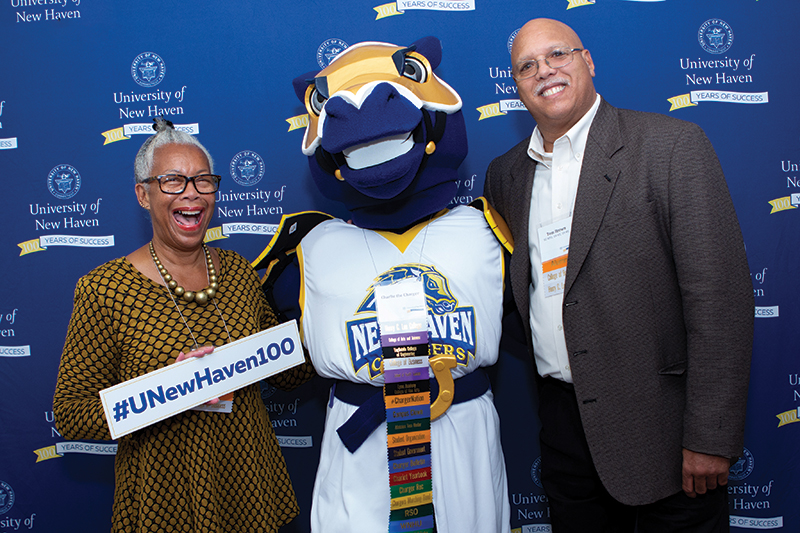
In advance of our Centennial in 2020, we took the University of New Haven on the road, hosting a series of signature events to commemorate this milestone anniversary.
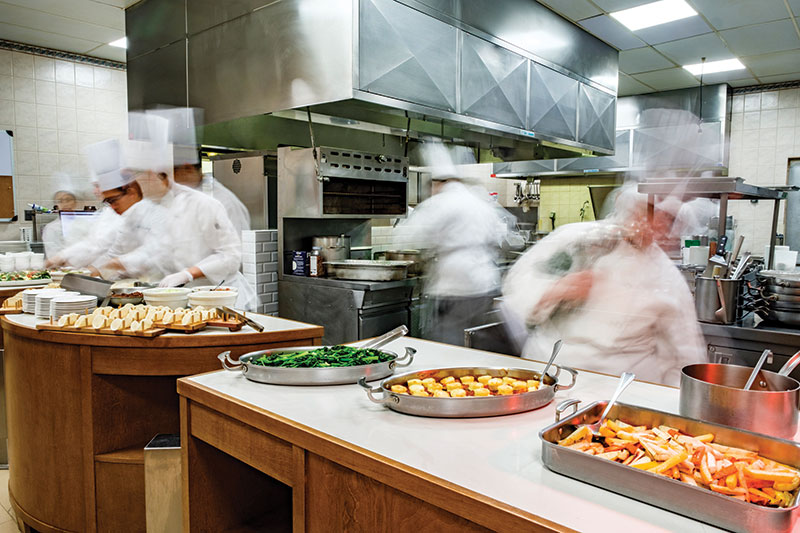
Tim Ryan ’94, EMBA ’96, head of the Culinary Institute of America, believes in working hard and eating well.